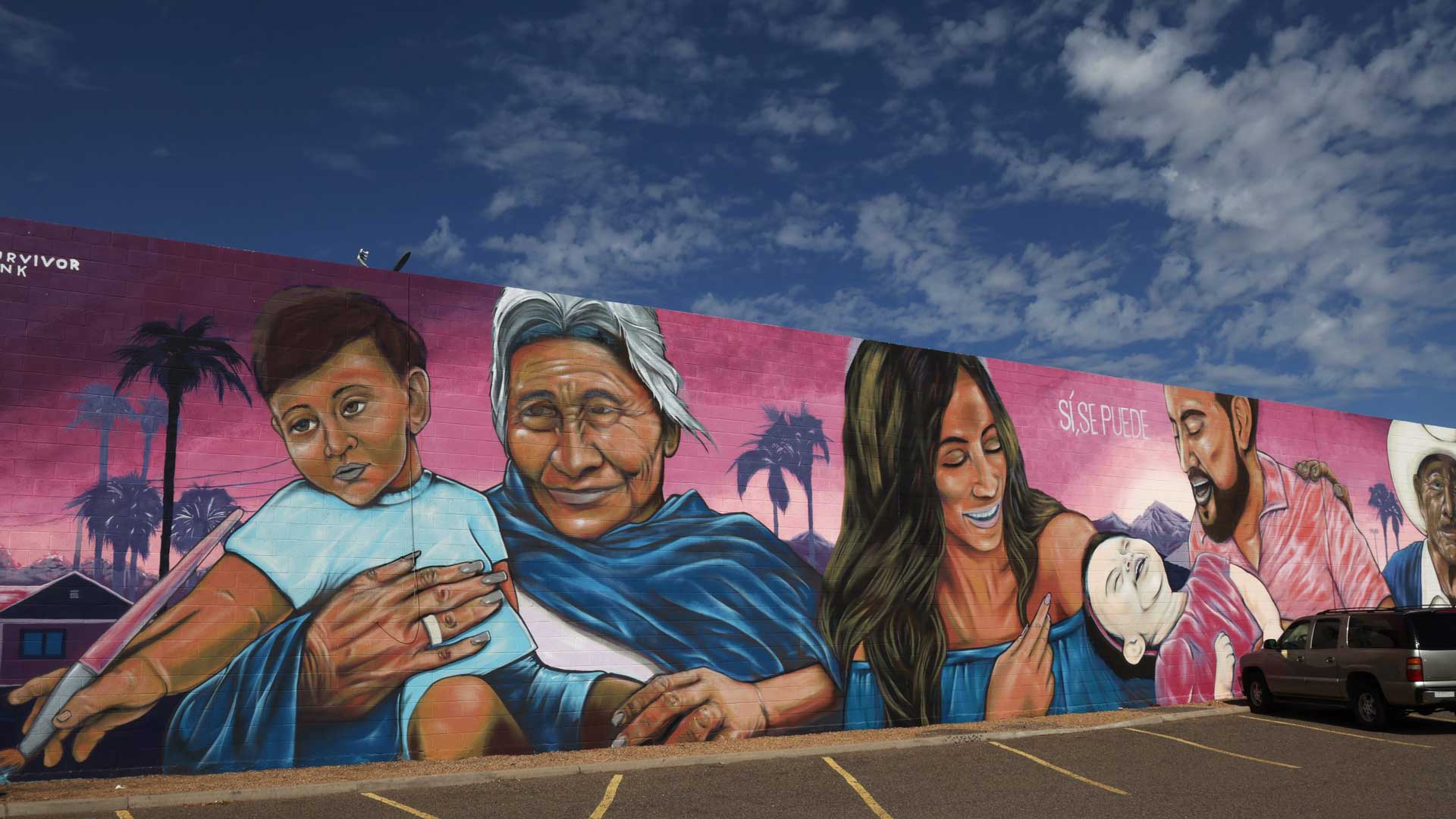 A mural of a Hispanic family emblazoned with the popular Spanish phrase “Si, se puede”
welcomes visitors at Chicanos Por La Causa’s Centro de la Familia in Phoenix on September 13, 2023.
A mural of a Hispanic family emblazoned with the popular Spanish phrase “Si, se puede”
welcomes visitors at Chicanos Por La Causa’s Centro de la Familia in Phoenix on September 13, 2023.
Sandra Noemy Chacón Hernández couldn’t sleep at night, couldn’t leave her home except to go to work, and was constantly fighting with her teenage daughter. She says she immigrated with her children to the United States from El Salvador in 2016 to escape an abusive partner, but instead of finding a safe haven in her Arizona home, she found herself isolated, depressed, and searching for help.
For many Spanish speakers, like Hernández, finding affordable and accessible mental health care in Phoenix can be nearly impossible. The Hispanic population became the largest racial demographic in the city in 2021, according to data from the U.S. Census Bureau, but a recent study found that the availability of Spanish-language mental health care treatments in Arizona is trending downward.
Fortunately for Hernández, a neighbor told her about Chicanos Por La Causa, a regional nonprofit organization providing social services, including therapy in Spanish, to primarily Latino and Hispanic populations.
Behind a dollar store and raspados (shaved ice) shop, Chicanos Por La Causa’s Centro de la Familia is nestled in the corner of a strip mall in Maryvale Village, a Phoenix neighborhood where over 75% of the population is Hispanic and more than half earn less than 200% of the federal poverty level.
Inside the center, bright colors and murals displaying familiar Mexican imagery, like the Virgen de Guadalupe, greet clients waiting to receive therapy services. The center assists clients in accessing both treatment and funding sources, such as Arizona Health Care Cost Containment System plans and grants from the American Rescue Plan Act.
In addition to the cost of mental health services, cultural and political barriers can stand in the way of Hispanic people seeking care. Gender norms, family dynamics, and fear of institutions because of immigration status can also prevent people from accessing mental health care, said Richard Galindo, a Hispanic therapist at Chicanos Por La Causa.
“You could give them the best therapy in the world,” said Galindo, “but if they don’t trust what you’re saying or don’t have a belief in what we’re asking them to do, you might as well just talk to the wall.”
Finding specialized care can be especially challenging for Spanish-speaking patients. A 2022 study published in the journal Psychiatric Sciences shows the percentage of facilities offering Spanish-language mental health care services decreased between 2014 and 2019 in 44 states, including Arizona. Galindo recalls spending weeks searching for a bilingual trauma therapist for two young clients with Spanish-speaking parents before finding an agency with any availability.
“When you have some cultural understanding of where they’re coming from, it removes a lot of the self-doubt,” Galindo said. “It creates that atmosphere of trust, and I even bring it up during my first sessions.”
About 8% of the U.S. psychology workforce identified as Hispanic in 2021, despite representing 18% of the population that year, according to estimates from the American Psychological Association and U.S. Census Bureau. Professional organizations, like the National Latinx Psychological Association, are seeking to advance psychological knowledge, training, and application in Latino communities.
For Manuel Zamarripa, president of the National Latinx Psychological Association, the importance of Spanish-language therapy goes beyond simple translation.
“When it comes to expressing emotional distress or emotional elation, we gravitate towards the Spanish language,” said Zamarripa, who holds a doctorate in counseling psychology. “When we are not able to do that because the person across from us can’t understand, that’s incredibly significant.”
In addition to treatment, Zamarripa stressed the importance of Spanish language and cultural competency training programs, noting there are few professional training programs offering specialized certifications like the ones offered at The Chicago School of Professional Psychology and Our Lady of the Lake University in San Antonio. He pointed to increases in Hispanic-serving institutions and diversity commitments from larger professional organizations, like the American Psychological Association, as indicators of positive movement, but said that more progress needs to be made toward equity and understanding.
“The field itself still needs to work to be more inclusive of our values, and our ways of looking at wellness and health care. We’re much more collectivistic,” Zamarripa said. “We’re much more community-oriented and familial in how we construct problems and solutions.”
Every Wednesday, Sandra Hernández attends a women’s support group hosted by Chicanos Por La Causa with other Spanish-speaking women from immigrant backgrounds. Hernández identifies this community group as a major contributor to her peace of mind and overall mental health support.
“I feel really good there, we have trust,” said Hernández when asked about the support group. “We are practically like a family.”
Cronkite News reporter Roxanne De La Rosa contributed to this story.

By submitting your comments, you hereby give AZPM the right to post your comments and potentially use them in any other form of media operated by this institution.